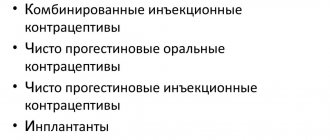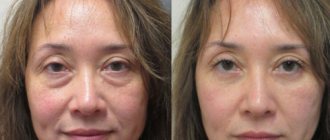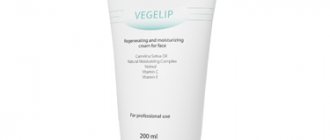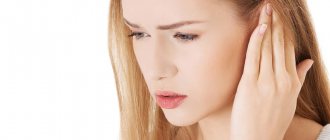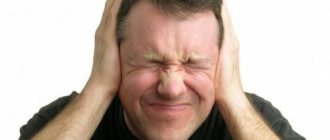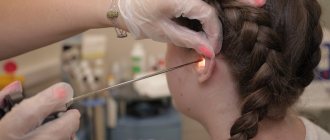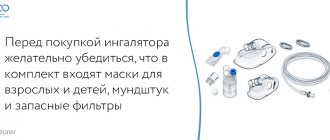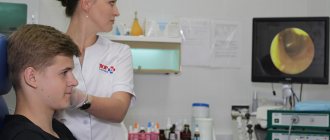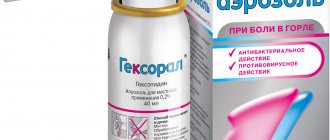Noise in ears - These are auditory sensations observed in the absence of an external sound signal. In most cases, we are talking about subjective tinnitus (only the person himself can hear it), and only sometimes about objective noise (if, for example, the auditory sensation is caused by involuntary muscle vibration, then the doctor can also hear it - using a phonendoscope).
Data on the prevalence of tinnitus vary widely. This is explained precisely by the fact that tinnitus is not recorded objectively. The following experiment was conducted: people who had never complained of tinnitus before were placed in conditions of absolute silence. And 93% of those who took part in the experiment said they heard some kind of noise. On the one hand, we can simply not pay attention to the fact that we have tinnitus, since we live in a constant external sound background (for a city resident, this is a standard situation). On the other hand, in the absence of an external signal, hearing becomes sharper and begins to “read” the noises of the body itself, or the nervous system “makes up” for the missing sounds by generating a signal on its own (at the level of the nervous system this is no longer an acoustic vibration, but an electrochemical process).
How does tinnitus manifest?
Structure of the Ear Tinnitus can also be described as ringing, rustling, creaking or buzzing in the ears.
In most cases, tinnitus does not interfere with normal life. At the same time, the symptom may intensify. Doctors distinguish four degrees of tinnitus (depending on the patient’s condition):
- first degree – tinnitus does not affect a person’s well-being;
- second degree – noise causes discomfort in quiet conditions and interferes with sleep;
- third degree - discomfort from tinnitus is constantly felt, the person does not get enough sleep, the quality of life deteriorates significantly;
- fourth degree - tinnitus creates unbearable discomfort.
An important point: noise is felt in one or both ears. Noise in one ear is caused by a local cause; if there is noise in both ears at once, then the problem is most likely systemic in nature.
It is also important what other symptoms are observed along with tinnitus. For example, is tinnitus accompanied by hearing loss (hearing loss). Sometimes tinnitus is accompanied by symptoms such as headache, dizziness, and nausea.
Main symptoms of the disorder
The main symptom is the actual noise in the head. This is a subjective phenomenon that patients describe as a humming or ringing sound. There are tingling sensations in the ear or even in the head. But the noise is audible only to the person himself - i.e. objectively there is none.
Judging by the description, the hum can be of different types - it is a whistle, a pulsation, even a roar. Sometimes patients report hissing or whistling, as well as humming and buzzing. The phenomenon of tinnitus is a deviation in itself. But often it also speaks of more serious illnesses.
At the same time, you have to live with noise constantly. This can give rise to other unpleasant symptoms, such as irritation, fatigue, and inability to concentrate on a particular task. In addition, patients may perceive the sound as very serious. This leads to mood swings and sleep disorders, and generally worsens the quality of life.
Causes of tinnitus
Tinnitus can be caused by a wide range of causes, including some serious medical conditions. First of all, tinnitus is caused by pathologies of the hearing aid. They can be classified by area of localization.
Pathologies of the inner ear:
- presbycusis – atrophic and dystrophic changes in the inner ear of an age-related nature. In this case, tinnitus usually accompanies the development of hearing loss;
- noise damage to the inner ear. The reason may be, for example, listening to loud music on headphones for a long time;
- long-term use of certain medications that are characterized by ototoxicity (adverse effects on the hearing organs);
- otosclerosis (pathological growth of bone tissue of the inner ear). With otosclerosis, noise and hearing loss are observed first in one ear, and a few months later the pathology may develop in the second ear;
- Meniere's disease (fluid accumulation in the inner ear cavity). The main symptom of the disease is dizziness;
- labyrinthitis (inflammation of the inner ear). It also manifests itself primarily as dizziness. Tinnitus is a minor symptom.
Middle ear pathologies:
- Otitis media (inflammation of the middle ear). The main symptoms are ear pain, fever, and possible purulent discharge from the ear. Ear congestion and noise are caused by the presence of fluid (such as pus) in the tympanic cavity;
- exudative otitis (accumulation of fluid in the middle ear cavity). This type of otitis media is worth highlighting separately, since, as a rule, there are no other symptoms with it, except for hearing loss and tinnitus;
- damage to the eardrum (for example, as a result of sound trauma).
Pathologies of the external ear:
- sulfur plug;
- an insect or foreign body entering the ear canal.
Other possible causes of tinnitus
Tinnitus can also be caused by:
- pathologies of the cardiovascular system
. In particular, with atherosclerosis, plaques on the walls of the arteries lead to disruption of blood flow, and turbulence (turbulence) occurs. This uneven movement of blood causes vibration, which is perceived by the hearing aid and is felt as tinnitus. The sensation of tinnitus intensifies with an increase in blood pressure, which can be persistent (hypertension), or can be caused by situational factors such as stress, alcohol or caffeine consumption;
- pathologies of the nervous system
. Noise in one ear, accompanied by hearing loss, dizziness and a sensation of “goosebumps” crawling across the face, is observed with a neuroma (tumor of the auditory nerve). Tinnitus can also be a symptom of multiple sclerosis or migraine.
Diagnostic methods
Timely diagnosis is the main condition for successful treatment of diseases that are accompanied by headaches and tinnitus. After the examination, the doctor will prescribe additional examinations that will determine the main cause of the deterioration in health. So, the following diagnostic methods may be needed:
- measuring blood pressure, including monitoring this indicator throughout the day;
- blood tests - general and biochemical, as well as determination of glucose and cholesterol levels;
- angiography of cerebral vessels - allows you to determine the intensity of blood circulation, the presence of spasms and blockage of the arteries;
- computer or magnetic resonance imaging is the main method for detecting tumors, aneurysms and other pathologies that require surgical treatment, as well as diseases of the cervical spine.
The Clinical Brain Institute houses precise, modern equipment for diagnosing a number of diseases. Experienced doctors will prescribe only the necessary examinations, which will allow you to quickly make an accurate diagnosis and begin treatment. It is important that it is impossible to obtain all the necessary information about the stage of the disease and its causes either at home or on the basis of a simple examination.
When should you see a doctor if you have tinnitus?
Noise in ears
If you begin to hear tinnitus, that is, if it appears and does not go away, you need to see a doctor and find out its cause in order to exclude the development of the most dangerous diseases.
You should definitely consult a doctor if you experience the following along with tinnitus:
- hearing loss;
- neurological symptoms (dizziness, loss of coordination, nausea, vomiting);
- severe headache or pain in the heart area.
You should also see a doctor if the intensity of the noise increases (if the tinnitus is causing a deterioration in your quality of life).
Diagnosis and treatment of tinnitus
It is not possible to objectively test the presence of noise in the head, such as, for example, to identify a tumor or fracture. This is a subjective phenomenon, available only in the patient's description. Therefore, during the examination, the doctor listens to complaints and analyzes them.
The specialist also finds out whether there have been head injuries in the past, and whether the patient has bad habits. Another important question is whether a person’s work involves loud noises. In some cases, you will also need to see a dentist, as tinnitus may be associated with jaw problems.
Treatment is aimed at eliminating the underlying cause. The fact is that noise is not a disease. This is only a symptom that manifests itself as a consequence of other pathologies. Various means are used for therapy:
- dental treatment;
- use of hearing aids;
- taking antibiotics;
- removal of earwax and other obstructions;
- surgery related to joint correction;
- treatment of diseases of the nervous system.
Interestingly, even in relatively healthy people, noise sometimes occurs spontaneously. Moreover, in most of these cases it goes away on its own, without any therapy. Although tinnitus cannot be cured in 25% of patients. They have to live with this symptom, which periodically appears, may disappear, intensify or weaken.
Treatment for tinnitus
Treatment for tinnitus
Treatment for tinnitus involves identifying and treating the underlying condition. Unfortunately, some pathological changes that cause tinnitus are irreversible (such as age-related changes). In some cases, eliminating the cause of tinnitus is quite simple (for example, the doctor will remove the wax plug immediately). In other cases, serious examination and medication may be required.
The sooner you see a doctor, the greater the likelihood of restoring your hearing acuity and getting rid of tinnitus.
Classification
According to the sound characteristics, tinnitus is divided into tonal - continuous sounds of the same frequency (ringing, whistling, low-frequency hum) and non-tonal - periodic unpleasant auditory sensations in the form of clicks, crackling, rumble. According to the duration, the symptom is divided into acute (up to 3 months), subacute (from 3 to 12 months) and chronic (lasting more than 1 year). In clinical practice, tinnitus is classified depending on the cause of its occurrence:
- Subjective noise
. Often caused by prolonged exposure to loud sounds on the auditory analyzer. Extraneous sounds are heard only by the patient, which prevents the person from concentrating on the actions being performed or talking. - Neurological noise
. This type of tinnitus is caused by damage to specific nerve receptors in the inner ear, as occurs in Meniere's disease. Patients experience a strong buzzing sensation, usually accompanied by dizziness. - Somatic noise
. It can be associated with damage to any organ, pathological impulses from which excite the auditory analyzer. Somatic tinnitus is in some cases triggered by movements and touches. - Objective noise
. The rarest type of disorder, which is caused by deformations of the ear vessels and pathology of the muscular system. Extraneous “pulsating” sounds can be heard by the doctor when using a stethoscope.
To assess discomfort, Soldatov’s classification is used, which subdivides ear noise according to severity. At grade 1, performance is preserved, the person is adapted to extraneous sounds. The appearance of intense noise at night indicates a transition to stage 2. A constant strong hum, which interferes with the performance of usual duties, is disturbing at stage 3; with a complete loss of performance, stage 4 of the disease is diagnosed.
Drugs of other groups
Since medications used to treat tinnitus from other groups are used individually, we decided to combine them all together. This will include drugs that modulate histaminergic transmission, various phenothiazine derivatives, which are classified as antipsychotics, and block pathological autonomic afferentation. These are tranquilizers, which are also prescribed in the complex treatment of tinnitus and sleep disorders, phenobarbital, which has a pronounced sedative effect, and is used as second-line drugs. This also includes psychostimulants, which are used with anticholinergics and antihistamines, which potentiates their effect. These are also B vitamins and other drugs; let’s look at some of them in more detail.
Betahistine (Betaserc, Betaver, Vazoserc, Vertran, Vestibo, Tagista)
Popularity rating:* 4.9
Betahistine is a histamine receptor blocker, modulates the transmission of histamine and serotonin, and is effective not only for tinnitus, but also for other vestibular disorders: dizziness, nausea and vomiting.
Betaserc causes expansion of the arterial part of the capillaries, normalizes the endolymph pressure gradient in the labyrinth and in the tissues of the cochlea, which improves the condition in patients with dizziness. Along the way, it increases the tone of the smooth muscles of the bronchial tree and gastrointestinal tract, which leads to increased secretion of gastric juice. Betahistine is indicated for vestibular neuronitis, benign positional vertigo, as a means of prevention after neurosurgical operations, and for vertebrobasilar insufficiency.
It is advisable to take the drug at the beginning of therapy at 8 mg or 16 mg 3 times a day. Treatment should be long-term, but the duration is determined by the doctor.
The drug has different dosages; 16 mg tablets in an amount of 30 pieces will cost from 608 rubles. Tablets 24 mg 20 pieces from 529 rubles, and tablets 24 mg 60 pieces will cost from 1283 rubles. Betaserc is manufactured by Abbott, the Netherlands.
The cheapest domestic Betahistine can be found in a pharmacy from 71 rubles, this is 16 mg No. 30.
Advantages and disadvantages
The drug is quite well tolerated, but has a small range of side effects. It is undesirable to prescribe it for bronchial asthma, exacerbation of stomach ulcers, and also in the presence of pheochromocytoma. Naturally, the drug is contraindicated for pregnant women, especially in the first trimester, as well as during breastfeeding. If the patient experiences dyspeptic symptoms due to the medicine, then it is better to take Betahistine after meals. If the patient has allergies and takes antihistamines, they reduce the effect of taking Betaserc, this must be remembered.
Aminazine
Popularity rating:* 4.8
Aminazine blocks vegetative impulses in the parasympathetic nuclei and in the cortical parts of the auditory analyzer. It blocks central contacts between adrenergic and dopaminergic synapses. The drug is rarely prescribed, in complex therapy and only in severe cases. Aminazine is classified as an antipsychotic, which means that it is strictly a prescription drug. Usually they treat psychoses, phobias, withdrawal symptoms and delirium tremens, that is, delirium tremens. In addition, it is used to treat delusions and hallucinations, so the main range of applications is psychiatry, large and small. However, it is also used in the treatment of dermatitis, vomiting in pregnant women, Meniere's disease and other disorders of hearing and vestibular function, including tinnitus.
The drug is available in tablets and ampoules; for the treatment of tinnitus it is used only in complex therapy, in severe cases and in small doses, as determined by the doctor.
A pack of 10 tablets of chlorpromazine, 50 mg each, can be purchased at a price of 200 rubles, produced by the Russian pharmaceutical company Valenta Pharmaceuticals.
Advantages and disadvantages
Aminazine cannot be used for a long time; this drug is exclusively a prescription drug, and even ENT doctors may have difficulties prescribing it. It is contraindicated in all severe disorders of the function of internal organs, including cardiovascular pathology and prostatic hyperplasia. Aminazine has pronounced side effects, including extrapyramidal and parkinsonian reactions, a drop in blood pressure, jaundice and leukopenia may occur. While taking it, impotence may develop, the menstrual cycle may be disrupted, and body weight may increase.
There are a lot of special instructions, for example, a ban on drinking alcohol during treatment with aminazine, and there are also many drug interactions. Thus, aminazine reduces the threshold of convulsive readiness if it is used together with anticonvulsants, if it is prescribed together with medications for increased thyroid function, then it has a harmful effect on the blood. But in some cases, it can still relieve severe symptoms of noise, and it is recommended for use by official instructions, which is why it is on the list.
Milgamma
Popularity rating:* 4.7
Finally, since disturbances in nerve conduction, reduced trophism of the afferent portions of the auditory nerve, a disorder in the transmission of nerve impulses and the appearance of noise play a great role in the pathogenesis of tinnitus, the use of B vitamins, which are neurotropic, is indicated in complex therapy. One of these drugs will be the well-known Milgamma Compositum, which is available in both tablets and dragees. Milgamma compositum contains vitamins B1, B6, and the ampoule of Milgamma contains vitamins B12. In addition to tinnitus, Milgamma is prescribed for neurological diseases: trigeminal neuralgia, herpes zoster, polyneuropathy, including diabetic and alcoholic, shooting pain in the back, that is, lumbago with sciatica.
The drug must be taken one tablet per day; according to the doctor’s indications, the dose can be increased to one tablet three times a day. Treatment usually lasts for a period of 1 month. Dragees Milgamma compositum in the amount of 30 pieces, designed for a month of treatment, will cost from 625 rubles, and it is produced by the German company Vorvag Pharma.
Advantages and disadvantages
Milgamma also has disadvantages, these are symptoms of overdose, which can even lead to a neurotoxic effect, and if the medicine is used for longer than six months, then sensitivity disorders and weakness in the arms and legs may occur, that is, the opposite effect. Despite the seeming harmlessness of vitamins, there may be side effects. These are skin itching, urticaria and rash, Quincke's edema. Sometimes there may be nausea, increased sweating, and tachycardia, so it is still better to use Milgamma on the recommendation of a doctor and under his supervision.
There are probably no other medications that can cure this disorder, and even these alone are unlikely to do anything in advanced cases. Tinnitus is treated comprehensively, using physiotherapeutic methods of treatment, with hearing aids, especially if tinnitus is combined with hearing loss. In some cases, even surgical treatment is indicated. One of the methods affects the cervical sympathetic nodes, and the second method is to influence specific auditory structures. This is tympanoplasty, stapedoplasty. Such operations can be used to reduce tinnitus, the source of which is the hearing organ itself.
*The popularity rating is based on an analysis of demand data from the wordstat.yandex.ru service.
Causes of noise not related to hearing aids
If there is noise in the ear, and unbearable pain also occurs, the causes of this condition will not necessarily be related directly to the hearing aid. Often the cause of tinnitus and pain is such diagnoses and conditions as:
- hypertension;
- atherosclerosis;
- metabolic problems;
- diabetes;
- osteochondrosis;
- side effects from taking certain medications;
- poisoning with alcohol or toxic substances.
If unpleasant symptoms do not go away, but only intensify, the best decision would be to consult an ENT doctor to understand the cause of this pathological condition.
Diagnostics
At the initial consultation, the ENT doctor questions the patient for complaints, collects a detailed history and performs an otoscopy or endoscopic examination. An informative study of the degree of hearing impairment is audiometry. In addition, a tympanometric study of the functions of the middle part of the hearing organ (tympanic membrane and auditory ossicles) can be carried out. If there is a suspicion of a disease of the labyrinth (internal part of the hearing organ), special tests are performed to identify vestibular abnormalities. Sometimes an X-ray, CT scan or MRI may be needed.
Sign up for a consultation right now!
Call us by phone or use the feedback form
Sign up
At the same time, laboratory blood tests and examination of discharge from the ear cavity, if any, are prescribed to determine the causative agent of the disease and sensitivity to antibiotics.
To make a diagnosis, as a rule, a routine examination or questioning of the patient’s complaints is not enough; it is necessary to conduct a set of studies to establish the correct cause of the unpleasant condition.
Causal factors
Objectively detectable (vibratory) noise in the right or left ear appears as a result of the following reasons:
- Neuromuscular disorders;
- At the same time, both muscular and joint disorders caused by lesions in the area of the connection of the lower jaw with the temporal bone;
- Vascular disorders - improperly located vessels, tumors growing from the middle ear, shunting between arteries and veins.
In all these cases, the physiological laminar flow of blood through the vessels is disrupted, turning into turbulent flow, which causes the appearance of noise.
Subjective (non-vibrator) noise in the right ear and left appears as a result of the following conditions:
- Metabolic disorders in which the excitability of auditory receptors changes - decreased or increased glucose levels, hormonal changes;
- Brain tumors affecting the centers of perception of sounds;
- Damage to the hearing organ of any nature - wax plug, inflammation, Meniere's disease, ear injury due to changes in pressure;
- Toxic injuries associated with drug or methanol poisoning. Among the medications dangerous for the ear are aminoglycosides, salicylates, arsenic, cytostatic drugs, angiotensin-transforming enzyme inhibitors, lidocaine, calcium blockers, etc.;
- Vibration and occupational noise, which leads to damage to the hair cells of the cochlea and labyrinth;
- Damage to the cervical spine, etc.
Means that normalize blood circulation and metabolism
The group of these drugs includes vinpocetine, Ginkgo Biloba derivatives, ergot, slow calcium channel blockers, and antihypoxants. Of course, they are used not only for tinnitus, but also for other diseases. After all, a special medicine that is used only for tinnitus, and nowhere else, is not yet known to science.
Vinpocetine (Cavinton, Telektol)
Popularity rating:* 4.9
Vinpocetine has already been repeatedly described in various medicinal reviews as a remedy for chronic cerebral ischemia, to improve memory and attention. Vinpocetine is a modified vinca alkaloid, its task is to optimize cerebral blood flow, it dilates blood vessels, and reduces aggregation, or sticking together of platelets. In addition to tinnitus and hearing loss, the drug is indicated for vascular dementia and ischemic strokes. Cavinton is prescribed for vertebrobasilar artery syndrome, retinal degeneration, encephalopathy and Meniere's disease. It is indicated for cerebral atherosclerosis, various forms of headaches, the consequences of traumatic brain injuries and memory loss.
Cavinton and Vinpocetine are taken after meals; there is also a new form - Cavinton Comforte. It is more active and contains 2 tablets of regular Cavinton, 5 mg each, that is, the dose is 10 mg. The drug is taken from one to 3 times a day, and is available in tablets that dissolve and do not need to be swallowed. The tablets have a pleasant orange taste.
Cavinton Comforte 0.01 No. 30 costs from 240 to 420 rubles in pharmacies; it is a Hungarian drug produced by Gedeon Richter. The cheapest domestic Vinpocetine can be purchased at a price of 25 rubles, it is produced by the Irbit Chemical Pharmaceutical Plant, dosage 5 mg No. 20.
Advantages and disadvantages
The disadvantage of Cavinton is the fact that there is a slight increase in the heart's need for oxygen, and therefore it is not prescribed for angina pectoris, heart failure, or cardiac arrhythmias. If Cavinton is used parenterally intravenously, it should be administered very slowly.
Ginkgo biloba (Tanakan, Bilobil, Ginkum, Memoplant)
Popularity rating:* 4.8
All medications Ginkgo Biloba improves metabolism and blood fluidity, or its rheological properties. In addition, the drugs are easily stimulating, have a mild antidepressant effect, and are most indicated for patients with short-term exposure to tinnitus. It is important that Tanakan has registered itself well in modern double-blind, placebo-controlled studies.
It is very important that the plant raw materials in Tanakan, which are used for medicines, are clearly dosed and standardized. Taking Tanakan is indicated for any form of cognitive deficit, pathology of the arteries of the lower extremities, and the presence of intermittent claudication, vascular impairment of vision and hearing, as well as Raynaud's syndrome and disease. Tanakan can be used for hearing disorders and tinnitus, one tablet three times a day, and the course of treatment is long, at least 3 months. You can take Tanakan for up to six months or even longer, but only as prescribed by a doctor.
Tanakan, manufactured by Bofur Ipsen, is one of the best and purified medicines containing Ginkgo Biloba leaf extract. Pack of 40 mg tablets, 90 pcs. will cost from 1200 to 1900 rubles, the drug is made in France. Much cheaper is the drug Bilobil, 60 capsules of which in the same dosage can be bought at prices starting from 550 rubles, produced in Slovenia, KRKA. The drug Ginkoum, which is produced by the domestic company Evalar in the same dosage, in the same quantity, costs Tanakan and will cost you from 530 to 860 rubles.
Advantages and disadvantages
Tanakan is usually very well tolerated and has no overdose effects. However, the drug can cause in rare cases, less than 1%, headache, nausea, rash, dizziness. Experience with Tanakan has shown that the severity of side effects does not depend on the duration of treatment, but if they occur, the drug should be stopped. Despite its good tolerability, Tanakan in tablets (and also in syrup) is contraindicated for erosive gastritis, gastric ulcers, stroke and acute myocardial infarction, and decreased blood clotting. The medicine is not recommended for pregnant and lactating women. Tanakan tablets contain lactose, so it should not be prescribed to patients with a congenital disorder of lactose metabolism. Perhaps the biggest disadvantage is the high cost and the need to take it for several months, but in the case of tinnitus, all medications are taken for quite a long time.
Cinnarizine (Stugeron, Vertizin)
Popularity rating:* 4.7
Stugeron is a fairly old drug, it was used back in the Soviet Union, and indications also include migraine, transient ischemic attacks, various forms of dizziness, the recovery period after strokes, both ischemic and hemorrhagic, vascular disease, and memory loss. Quite often it was prescribed as a cure for headaches. This drug is a calcium channel blocker that is particularly capable of improving vestibular blood flow, as well as peripheral blood flow in the coronary vessels of the heart. Cinnarizine also improves the body's resistance to hypoxia.
Cinnarizine is available in 25 mg tablets, and its effect is to inhibit the release of vasoactive substances. These are adrenaline, dopamine, histamine, bradykinin. It improves the ability of red blood cells to deform, reduces blood viscosity and increases its fluidity. For tinnitus, you need to take the drug 25 mg, that is, one tablet three times a day. It is also indicated for air or sea sickness, that is, for kinetosis, half an hour before a flight or departure of a sea vessel.
The drug Stugeron, which is produced by the Hungarian company Gedeon Richter, will cost from 186 rubles, this is 50 tablets of 25 mg. The cheapest cinnarizine of the same dosage can be purchased at a price of 35 rubles, and it will be a Bulgarian drug from Sopharma.
Advantages and disadvantages
Despite its effectiveness, strict monitoring is necessary, since long-term use of cinnarizine in high doses can enhance the depressive effect and induce the development of drug-induced parkinsonism.
Stugeron also has quite pronounced side effects. These include abdominal discomfort and dry mouth, weight gain with long-term use and sweating, headaches and bouts of drowsiness, development of jaundice and allergies. It should also be remembered that the effect of Stugeron can be enhanced by taking antidepressants, as well as alcohol.
Trimetazidine (Preductal MV, Angiozil, Deprenorm, Rimekor, Trimectal)
Popularity rating:* 4.6
These are antihypoxic drugs that increase the resistance of the tissues of the middle and inner ear and labyrinth to low amounts of oxygen, and help increase cerebral and labyrinthine blood flow. Preductal and its analogs will be most effective for tinnitus if the patient has a peripheral disorder, for example, cochleovestibular syndrome, and at the same time in combination with cardiac pathology. In this case, Preductal will increase both myocardial reserves and its resistance to hypoxia. Preductal should be taken one tablet twice a day, with meals.
The original slow-release drug Preductal (MB), produced by Servier (France), is considered to be the best in quality, but it is not always available in pharmacies. One package of capsules of 35 mg No. 60 can be purchased in pharmacies at a price of 2964 rubles. The cheapest trimetazidine is probably 20 mg tablets No. 30, which will cost from 70 rubles. and higher. This is domestic trimetazidine, produced by Ozon. What kind of substance is there and why it is so cheap is unknown.
Advantages and disadvantages
When taking Preductal, contraindications must be taken into account. These are disorders of the extrapyramidal system, Parkinson's disease and restless legs syndrome, severe renal failure, pregnancy, breastfeeding and persons under 18 years of age. There may also be side effects, the most common of which are abdominal pain, diarrhea, dizziness and unsteadiness of gait, and skin rash.
Dihydroergocryptine + caffeine (Vasobral)
Popularity rating:* 4.5
This medicine is a derivative of ergot alkaloids with caffeine added to balance the effects. As a result, this medicine blocks alpha-adrenergic receptors, which are located in the blood vessels, and simultaneously stimulates the structure of the central nervous system, which regulate the synthesis of serotonin and dopamine. When exposed to the drug, vascular permeability decreases, aggregation of blood cells decreases, blood flow increases, and metabolism in the brain structures intensifies. All this leads to increased resistance of tissues and their ability to withstand hypoxia. Caffeine additionally stimulates the cerebral cortex, improves the functioning of the vasomotor and respiratory centers, and helps improve mental performance and reduce fatigue.
In addition to tinnitus and tinnitus, Vasobral is indicated for cerebral atherosclerosis, in complex therapy for rehabilitation measures after a stroke, for Meniere's disease, and in the treatment of acute and chronic labyrinthitis. Vasobral should be taken orally, 1 tablet 2 times a day, the duration of treatment is at least 2 months, and if necessary, the courses can be repeated up to 2 times a year. Vazobral is not cheap; a pack of 30 tablets will cost from 986 rubles.
Advantages and disadvantages
The disadvantage of Vasobral can be considered its high cost, as well as some side effects, which are most often manifested by nausea, abdominal discomfort, and symptoms of dyspepsia, that is, a feeling of heaviness in the abdomen, bloating, belching, and so on. If such symptoms from the gastrointestinal tract occur, as the official instructions state, discontinuation of the drug is not required. Very rarely, tachycardia, decreased blood pressure, and interaction with some blood pressure medications occur, where they will enhance their effect.
Master Hearing
This anti-noise medication comes in the form of propolis ear drops that do not contain alcohol. “Master Hearing” has antibacterial and anti-inflammatory effects. The drops are often prescribed for tinnitus and are a 100% natural product that does not cause side effects. “Master Hearing” improves cerebral circulation and accurate transmission of sound impulses. Often these drops are prescribed as a prevention of hearing problems for those who are forced to work in high-noise environments. The minimum course of treatment with Master Hearing is a week.
Master Hearing
Sashera-Med LLC, Russia
A natural remedy that allows you to avoid hearing loss and stop the negative processes occurring in the hearing aid.
The action of the drops is aimed at restoring the cells of the eardrum, the auditory nerve, improving blood circulation and transmission of impulses to the corresponding part of the brain, eliminating inflammation and the source of infection during purulent processes. 5.0 1 review
147
- Like
- Write a review
High-quality and reliable diagnostics at NEARMEDIC
If tinnitus occurs, the causes must be strictly identified. Only such a diagnosis is complete, because noise is just a symptom of a disease, and the doctor will determine which one. An accurately established diagnosis is the key to targeted and most effective treatment. Therefore, diagnostics should be trusted to professionals. These are the doctors who work at the NEARMEDIC center. Why do patients choose it? Because here:
- Modern diagnostic equipment;
- Highly qualified specialists who regularly improve their knowledge and skills;
- Comprehensive multidisciplinary approach to each patient.
To objectify existing disorders and identify their degree, doctors at the NEARMEDIC center use laboratory and instrumental diagnostic methods. They draw up an individual examination program based on the results of the initial examination. Laboratory methods that may be required include:
- General clinical blood test;
- Determination of lipid profile;
- Hormonal tests (primarily to assess the functional activity of the thyroid gland).
Of the instrumental methods, if there is noise in the left or right ear, the following are shown:
- Ultrasound examination of blood vessels and assessment of the nature of blood flow in them;
- Tone hearing threshold measurement;
- Magnetic resonance examination of the cervical spine and brain;
- Computed tomography of the brain with and without contrast.
When a patient complains of unilateral tinnitus, the doctor always remains oncological alert, because Tumors are particularly dangerous conditions. Their timely identification will help provide the most effective treatment.

